New 250kW Hydrogen Fuel Cell Prepped for Maritime
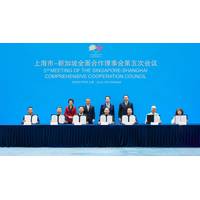
Sydrogen Energy Pte. Ltd. (Sydrogen), a Singapore-based fuel cell components and systems company, announced its entry into the maritime market with a 250 kW fuel cell power module. Developed in a collaboration signed with Shanghai Hydrogen Propulsion Technology Co., Ltd. (SHPT), this system aims to accelerate the adoption of hydrogen technology in the shipping industry, supporting Singapore's maritime decarbonization goals."Through a slew of initiatives both on shore…
LPG: Dual-Fuel Engines Prove Their Worth
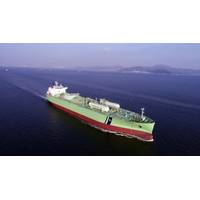
BW LPG has demonstrated the value of dual-fuel LPG operations beyond the company’s initial aim of meeting IMO 2020 Sulphur Cap regulations.In October 2020, the LPG carrier BW Gemini became the first very large gas carrier (VLGC) to have its low-speed main engine converted to an LPG dual-fuel engine. The project started several years earlier, sparked by Oslo-listed BW LPG’s preparations for the IMO’s 2020 Sulphur Cap regulations.Compared to heavy fuel oil…
WASP Sets Sail on its 3-Year Voyage
The WASP (Wind Assisted Ship Propulsion) project, funded by the Interreg North Sea Europe program, part of the European Regional Development Fund (ERDF) to the tune of €3.4 million has been officially approved and launched.The project brings together universities, wind-assist technology providers with ship owners to research, trial and validate the operational performance of a selection of wind propulsion solutions…
ABS, MARIN Launch Wind Propulsion Project
The classification society ABS and Netherlands based research institute MARIN have launched a Joint Industry Project (JIP) to investigate transparent and validated methods to assess performance of wind-assisted shipping propulsion technologies.The wind propulsion technology is a key driver in owners/operators investment decision-making.The JIP focuses on the majority of all marketed wind-assisted ship propulsors,…
IMO 2020: Hydrogen's Future in Maritime
Hydrogen fuel cell technology to Satisfy Future IMO RequirementsWith an ongoing push by the maritime community to reduce ship emissions to satisfy IMO MARPOL Annex VI regulations and limit the sulfur content of ships from 01 January 2020 to 0.5 percent world-wide, many ship owners are starting to consider hydrogen fuel cell technology to satisfy evolving emissions regulations. To date, hundreds of millions of dollars have been spent on research programs to utilize hydrogen fuel cells for transportation.
Maersk, Qatargas Ink LNG Propulsion Deal
The world’s largest LNG exporter Qatargas has signed a technical collaboration agreement with the Maersk Group to explore opportunities related to the use of LNG marine propulsion. It is estimated that the use of LNG propulsion can lead to a potential reduction in CO2 emissions of 25% compared to the use of conventional shipping fuels. The technical collaboration agreement, letter of intent, between Qatargas and the Maersk Group was signed by Mr.
Dynagas, GasLog, Golar LNG Team up to Operate LNG Carrier Pool
Dynagas Ltd., GasLog Ltd. and Golar LNG Ltd today jointly announced having entered into an LNG carrier pooling agreement to market their vessels, which are currently operating in the LNG shipping spot market. The LNG Carrier Pool allows the participating owners to optimise the operation of the pool vessels through improved scheduling ability, cost efficiencies and common marketing. The objective of the LNG Carrier…
ABB: Top Innovator for Marine Industry
ABB, the leading power and automation technology group, has been awarded the Innovation of the Year Award for the recently introduced Azipod D electric propulsion product at the Electric & Hybrid Marine World Expo in Amsterdam, the Netherlands. The Innovation of the Year Award identifies pioneering technologies that push the boundaries and contribute to making electric and hybrid propulsion possible and viable. The winner was selected by an international jury consisting of 38 maritime journalists…
Rolls-Royce to Showcase O&G Innovations at OTC
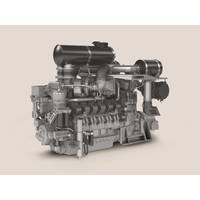
Rolls-Royce will showcase its latest offshore power and propulsion solutions and MTU engine technologies designed for onshore oil and gas applications at the upcoming 2015 Offshore Technology Conference (OTC), May 4-7. The exhibit will feature the MTU Frac Pack and the MTU S83 Frac Bi-Fuel Kit in addition to a Rolls-Royce offshore winch simulator. The MTU brand is part of Rolls-Royce Power Systems within the Land & Sea division of Rolls-Royce.
Asia's First LNG Powered Tugs Ordered
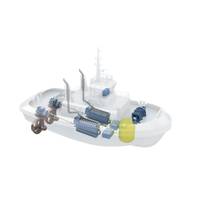
Rolls-Royce announced that it has won an order from Chinese state oil company CNOOC, to power Asia’s first gas powered tug. The order is for two tugs to be built at the Zhenjiang shipyard in Jiangsu, China, with an option for an additional two. The first tug is planned for delivery by the end of this year. Each tug features a pair of Rolls-Royce Bergen C26:33L9PG engines fueled purely by liquefied natural gas (LNG).
Diesel-Electric Propulsion for Offshore
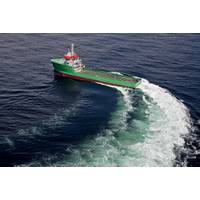
Long reserved for specialized applications such as icebreakers, diesel electric has enjoyed a rapid growth for marine propulsion in the past decade. Throughout that period, Cummins Marine has been a leader, supplying more than 900 diesel electric packages since delivering its first genset 2003. Early adopters of this flexible propulsion technology included the US firm Rigdon Marine with twenty vessels and France-based Bourbon Offshore with over 100 vessels.
Ship Fuel of Choice to Remain Heavy Oil in 2030: New Analysis
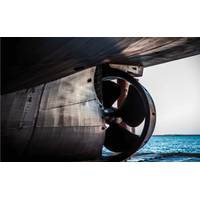
A new study by Lloyds Register and University College, London, discusses the prospects of marine fuels in 'Global Marine Fuel Trends 2030', giving insights into future fuel demand for the containership, bulk carrier/general cargo and tanker sectors (which represent about 70% of the global shipping industry's fuel demands). Fuel oil remains the main fuel for deep sea shipping; LNG develops a deep sea bunker market share of 11%; low sulphur heavy fuel oil and hydrogen emerge as alternatives in certain scenarios.
